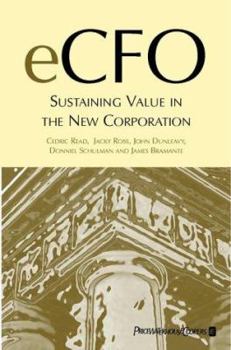Ecfo: Sustaining Value in the New Corporation
Important and groundbreaking financial strategy
Recognizing that traditional accounting and financial conventions may no longer provide the CFO with adequate armory to face the challenges of the electronic environment, eCFO takes a bold step forward to examine how modern CFOs must reposition themselves to operate effectively in this new era. Picking up where CFO: Architect of the Corporation's Future left off, this progressive new book provides new models and techniques to help corporations prosper in the twenty-first century. Featuring interviews at the start of each chapter from some of the world's leading CFOs-including Clayton Daly from Procter & Gamble, Tom Meredith from Dell Computers, and John Coombe from Glaxo Wellcome-eCFO draws on their experience to address the key issues they face in the new business environment.
Recognizing that traditional accounting and financial conventions may no longer provide the CFO with adequate armory to face the challenges of the electronic environment, eCFO takes a bold step forward to examine how modern CFOs must reposition themselves to operate effectively in this new era. Picking up where CFO: Architect of the Corporation's Future left off, this progressive new book provides new models and techniques to help corporations prosper in the twenty-first century. Featuring interviews at the start of each chapter from some of the world's leading CFOs-including Clayton Daly from Procter & Gamble, Tom Meredith from Dell Computers, and John Coombe from Glaxo Wellcome-eCFO draws on their experience to address the key issues they face in the new business environment.
Format:Hardcover
Language:English
ISBN:0471496421
ISBN13:9780471496427
Release Date:April 2001
Publisher:Wiley
Length:372 Pages
Weight:1.95 lbs.
Dimensions:1.1" x 6.2" x 9.3"
Customer Reviews
5 ratings
Highly Recommended!
Published by Thriftbooks.com User , 22 years ago
The gang at PricewaterhouseCoopers discusses the chief financial officer's role in the changing corporate landscape. The eCFO is no longer only involved with financial management, but must become an internal venture capitalist, opportunity seeker and risk taker who works closely with the CEO to anticipate trends, recommend new enterprises and manage company investments as a portfolio of financial ventures. The authors draw on in-depth interviews with leading CFOs, case studies, independent research and analysis of the latest best practices. Though charts, bullets and boxes impart a textbook flavor, and the trend material is a little familiar, the book is generally solid and informative. We from getAbstract suggest it to CFOs and CEOs who need that "e" awareness, or to any manager who is trying to drag the boss into the 21st century, or even the 20th.
Great book!
Published by Thriftbooks.com User , 23 years ago
As its predecessor, CFO: The Architect of the Corporation's Future, eCFO continues PwC's collection of financial masterpieces. eCFO provides a major turnaround in the finance function for the21st century. The new CFO profile will demand a series of capabilities in order to lead companies through the e-world. Technical skills no longer suffice; CFOs are to be great visionaries and good communicators/motivators in their new leadership role. For example, the new finance function has to take into account that budgets no longer work. They inhibit growth and creativity. I particularly liked a comment that said that budgets are an exercise of how small a company wants to be. Instead, the authors suggest using rolling forecasts as an alternative to foster creativity and at the same time control risks/costs.I highly recommend this book. This is the third book I buy from PwC's finance team: CFO, eCFO and In Search of Shareholder Value.
e is for expanding
Published by Thriftbooks.com User , 23 years ago
Although it contains more than its fair share of populist concepts and views it does provide an excellent insight into the expanding role of the CEO. Particularly useful were the comments of leading CEO's at some of the worlds most dynamic companies.
Excellent Book
Published by Thriftbooks.com User , 23 years ago
This book is far from typical. By focusing on modern management principles, it is both practical and informative and provides detail to implement new ideas that make a significant difference to my company's future. As a CFO it is refreshing to see a new perspective where the finance function looks at adding value not just on the balance sheet but contributing to customer strategy and contributing to decision-making in areas of software selection such as CRM, marketing tools and business intelligence. I applaud the authors for a looking at a fresh approach and would recommend this book to any company director seeking a competitive advantage. Well done!
The workforce of tomorrow
Published by Thriftbooks.com User , 23 years ago
This volume addresses the changes that e-business has brought to commerce. The authors cite a study finding that two-thirds of Fortune 500 companies believe that cultural resistance of managers is the biggest hurdle to implementing new technologies. They assert that human resource professionals need to be brought to the table at the earliest planning stages, in order to communicate with and encourage employees to ask for help in designing and testing new systems. Human resource people can focus on the future and encourage others to do so. They can learn to think intangibly, in line with the missions of many cyber-businesses. Most importantly, they can help managers create loops, not lines of communication. I'm a career counselor, and I don't understand everything in this book. However, this is a readable book, easy to pick through by topic. It can be read in manageable bites, and I'm encouraging frustrated, burned-out clients to read this book for a glimpse of what the future holds.





